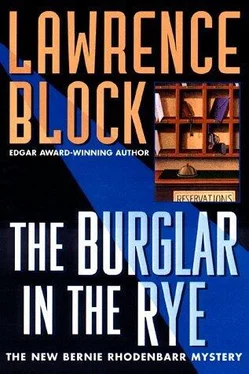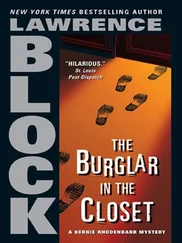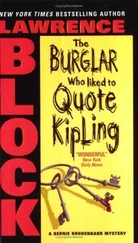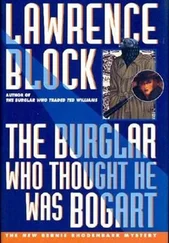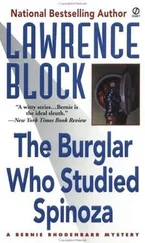The room would have been warm enough without the fire. It had been cool earlier when I laid the fire, but it was warm now, and I don’t know that it was the fire on the hearth that made the difference. Jam enough people into a room and they’re going to be warm, especially if some of them are a little hot under the collar to begin with.
We had a full house, all right. Isis Gauthier was there, looking much as she had on our first meeting, her hair in cornrows and her clothes a Paddingtonian riot of primary colors. Marty Gilmartin was nearby, more quietly dressed in muted tweed. Alice Cottrell wore a business suit and looked businesslike, and so did a man I’d never seen before, a very tall and very thin fellow with a narrow nose. I recognized everybody else in the room, so I worked it out that he had to be Victor Harkness from Sotheby’s, and I’d say he looked the part.
Gulliver Fairborn wasn’t there, with or without his silver beard and tan beret, with or without his wig and sunglasses. But the World’s Foremost Authority on the author and his works was present in the person of Lester Eddington. He had his shirt buttoned right for a change, but he still looked gawky and geeky, and no doubt would until Glamour magazine gave him a makeover.
Hilliard Moffett, the World’s Foremost Collector, was present as well, his bulk stuffed into gray flannel trousers and a houndstooth jacket, both of which he’d outgrown. He sat forward in his chair, looking more like a bulldog than ever. I have my checkbook, he looked to be thinking, so what are we waiting for?
There were only so many places to sit, and a couple of people were standing. Carl Pillsbury, star of stage, screen, and hotel lobby, was leaning against a wall, and managing to look as though he leaned against walls all the time. His white silk shirt was spotless and his dark slacks were sharply creased, but his black shoes were due for a shine. I guess he’d used up all the shoe polish on his hair.
Ray Kirschmann was standing, too, in-big surprise-an ill-fitting blue suit, and there was another cop posted next to the door. I hadn’t met him before and never did get his name, but it wasn’t hard to tell he was a cop, given that he was in uniform. And Carolyn Kaiser was there, of course, along with her friend Erica Darby. They both looked so feminine it was hard to believe nobody had rushed to give them a seat.
I went over and took center stage, which put me right in front of the oriental screen, which in turn was in front of the fireplace. I could hear the fire, which gives you an idea how quiet the room was. You’d have thought these people would have plenty to say to each other, but nobody was saying a word. They were all looking at me and waiting for me to say something.
I wasn’t sure how to begin. So I began the way I always do, given half a chance.
“I suppose you’re wondering why I summoned you all here,” I said. “It’s hard to know where to begin, and I’m not sure that the answer is to begin at the beginning. In the beginning, a man named Gulliver Fairborn wrote a book called Nobody’s Baby. If you feel it changed your life, well, you’re not alone. A lot of people feel that way, including most of the ones in this room.
“It certainly changed Fairborn ’s life, for better and for worse. It enabled him to make a living doing the only thing he really cared about-writing. But it made it difficult if not impossible for him to lead the anonymous life he longed for. He stayed out of the limelight, he shunned correspondence and interviews, he never allowed himself to be photographed, and he lived under assumed names. Even so, his privacy got violated from time to time.
“And a major violation was looming on the horizon. A woman named Anthea Landau, a longtime resident here at the Paddington, had been Fairborn ’s first literary agent. Now she made arrangements to offer the letters he’d written her for sale to the highest bidder. Anything with Fairborn ’s signature on it is rare, and actual letters from him are right up there with hen’s teeth.”
“I have a couple of his letters,” Hilliard Moffett said, “including one to a real estate agent in Hickory, North Carolina, inquiring about houses for rent. As far as literary correspondence is concerned, I don’t think he’s written anything of the sort in years. When he delivers a manuscript to his current agent, he just sends it by express mail with a false return address and no note enclosed.” He sighed. “He’s not an easy man to collect.”
“So the letters to Landau would be valuable,” I said. “Even priceless.”
“Nothing’s priceless,” said Harkness from Sotheby’s. He sounded as if he was quoting the firm’s motto, and who am I to say he wasn’t? “Except in the sense that the price could only be determined by discovering what the material would bring at public auction. I saw a sampling of the letters, and felt confident they would bring a substantial sum, certainly in the high five figures, and possibly well into six figures.”
“The letters haven’t been sold yet,” I said, “so we don’t know what they’ll bring. But we do know that they were valuable enough and desirable enough to bring some interesting people all the way to New York. Some of them are here now, in this room. There’s Hilliard Moffett, for instance, who already told you he has a couple of Gulliver Fairborn’s letters. He wanted the others.”
“I collect the man,” he said.
“And Lester Eddington, who knows a lot about Fairborn.”
“He’s my life’s work,” Eddington told us. “Moffett, I’d be interested in seeing that letter to the North Carolina realtor. I know he spent two years in the Smoky Mountains, and it would be useful to pin it down.”
“The letter’s not for sale,” Moffett snapped, and Eddington told him a copy would suit him just fine, or even a transcription. Moffett grunted in reply.
“And then there was Karen Kassenmeier,” I said.
I looked around, and every face I saw looked puzzled, except for Ray, who knew the name, and the other cop, who didn’t seem to be paying attention.
“Karen Kassenmeier was a thief,” I said. “She wasn’t a perfect thief, because she got caught a couple of times and went to prison for it, but she was pretty good at what she did, and she didn’t shoplift at the dime store. She stole high-ticket items, and the word was that she stole them to order.”
“And she came to New York, Bern?”
“From Kansas City,” I said, “according to the tag on her suitcase. But the airlines didn’t list a passenger named Kassenmeier on any of their Kansas City -to- New York flights in the past two weeks.”
“So she came earlier,” Moffett said, his jowls wagging.
“Or she used a false name,” Isis Gauthier suggested. “Criminals use aliases all the time, don’t they? Why, I met a man just the other day who called himself Peter Jeffries, or Jeffrey Peters. I can’t remember which, and neither could he.”
“It’s not that easy to use an alias on an airplane,” I said. “You have to show photo ID when you board, and you pretty much have to pay with a credit card or draw more attention from security than anyone would want, especially a thief. And if she used an alias, she wouldn’t have gone on using a luggage tag with her own name on it.”
“She might,” Erica said. “Criminals are stupid. Everybody knows that. Otherwise they wouldn’t get caught.”
“Sometimes they have bad luck,” I said, a little defensively. “Anyway, we know she used her own name because there’s a record of the flight she took. Three days before Anthea Landau was killed, Karen R. Kassenmeier was on a United flight from Seattle to JFK.”
“They got her name on the whatchacallit, the passenger manifest,” Ray said. “An’ there’s prolly a record of her flyin’ from Kansas City to Seattle, which’ll turn up if we look for it. What did she go an’ steal in Seattle, Bern? The dome off the stadium?”
Читать дальше
